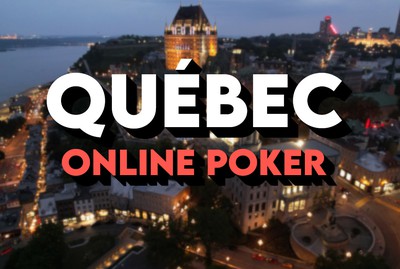Last updated: February 16, 2026


 Online poker in Quebec operates within a unique regulatory environment. Unlike Ontario, which adopted a competitive multi‑operator model in 2022, Quebec maintains a provincial monopoly through Loto‑Québec and its online platform, Espacejeux. At the same time, international poker networks remain accessible to Quebec players, creating a hybrid market shaped by both official oversight and global liquidity.
Online poker in Quebec operates within a unique regulatory environment. Unlike Ontario, which adopted a competitive multi‑operator model in 2022, Quebec maintains a provincial monopoly through Loto‑Québec and its online platform, Espacejeux. At the same time, international poker networks remain accessible to Quebec players, creating a hybrid market shaped by both official oversight and global liquidity.
Under the current framework, Loto‑Québec is the only provincially regulated operator authorized to offer online gaming within Quebec. However, the province does not operate a ring‑fenced poker network comparable to larger international platforms, and it does not share liquidity with Ontario or other jurisdictions. As a result, tournament guarantees and cash game depth on the official platform are more limited than those available on global networks.
In practice, many Quebec players participate on international poker sites that pool players across multiple countries. These platforms are not licensed by the province, but they offer access to substantially larger tournament fields, more consistent mid‑ and high‑stakes cash games, and broader software ecosystems.
As of February 2026, Quebec is at a regulatory crossroads. A coalition of major private gaming operators is urging the provincial government to adopt a regulated competitive model similar to Ontario’s, citing lost tax revenue and widespread offshore participation. Whether Quebec maintains its monopoly structure or moves toward a licensing framework remains uncertain.
This guide explains how online poker works in Quebec today, what is legally permitted, how the provincial model compares to international platforms, and what reforms may lie ahead.
Is Online Poker Legal in Quebec?
Online poker is legal in Quebec, but only through the provincially authorized operator, Loto‑Québec.
Loto‑Québec operates Espacejeux, the official online gaming platform for the province. It is the only operator authorized under Quebec law to offer regulated online gaming within provincial jurisdiction.
Unlike Ontario, which licenses multiple private operators under a competitive regulatory model, Quebec maintains a monopoly structure. No private online poker operators are licensed by the province.
However, the practical market reality is more complex.
International poker platforms remain accessible to Quebec residents. These sites are not licensed or regulated by Loto‑Québec, but the province does not actively prosecute individual players for participating on offshore platforms. Enforcement has historically focused on operator compliance rather than player activity.
This creates a dual‑track environment:
- Loto‑Québec operates the only provincially regulated platform
- International operators remain accessible but unlicensed locally
Players should understand the distinction. Provincially regulated play offers formal consumer protections under Quebec law, while international platforms operate under foreign regulatory frameworks.
As of February 2026, Quebec has not adopted a licensing system that allows private operators to apply for provincial authorization.
Calls for Reform in 2026
As of February 2026, Quebec’s online gaming framework is facing renewed pressure from private-sector stakeholders.
A coalition of major international gaming operators has publicly urged the provincial government to adopt a regulated competitive model similar to Ontario’s iGaming framework. The group argues that Quebec is losing significant tax revenue to offshore operators and that a modern licensing system would provide stronger consumer protections and regulatory oversight.
Ontario is frequently cited as the comparison point. Since launching its competitive iGaming market in 2022, the province has licensed dozens of private operators under provincial oversight while maintaining consumer protection standards through a centralized regulator. You can read a detailed breakdown of that model in our guide to Ontario Online Poker.
Quebec, by contrast, continues to operate under a monopoly structure through Loto‑Québec.
What a Competitive Model Would Mean
If Quebec were to adopt an Ontario‑style framework, the province could:
- License multiple private online gaming operators
- Require compliance with provincial consumer protection standards
- Capture tax revenue currently flowing to offshore platforms
- Potentially increase liquidity through broader operator participation
However, any transition would require legislative change and political support.
As of early 2026, no formal legislation has been introduced to dismantle the provincial monopoly. The current system remains in place.
The coalition’s call for reform signals that the regulatory status quo is under discussion, but it does not represent enacted policy.
International Poker Sites Accessible from Quebec
While Loto‑Québec operates the province’s only regulated online gaming platform, many Quebec players also participate on international poker networks.
These platforms are not licensed by the province. However, they remain accessible to residents and operate under regulatory frameworks in other jurisdictions, such as Malta, Gibraltar, or the Isle of Man.
The primary difference between the provincial model and international networks is liquidity.
Loto‑Québec operates a closed system limited to players within its platform. By contrast, international poker operators pool players across multiple countries. This shared liquidity supports:
- Larger tournament guarantees
- Deeper mid‑ and high‑stakes cash games
- More frequent major online series
- Broader game and format selection
For serious tournament players and higher‑volume cash players, liquidity is often the deciding factor.
GGPoker
GGPoker is one of the largest international poker networks globally. It offers access to a shared player pool that supports major online tournament series, high‑guarantee weekly events, and deep mid‑ and high‑stakes cash action.
Because liquidity is international rather than provincial, prize pools are typically larger than those available within Quebec’s monopoly model.
GGPoker is not licensed by Loto‑Québec.
WPT Global
WPT Global operates an international poker network backed by the World Poker Tour brand. It emphasizes tournament structures, branded championship events, and mid‑stakes scheduling.
Like other international platforms, WPT Global is not provincially regulated in Quebec but remains accessible to players within the province.
PokerStars
PokerStars remains one of the most established international poker brands. It operates a global network offering daily tournaments, Sunday majors, fast‑fold formats, and multiple poker variants.
As with other international platforms, PokerStars is not licensed by Loto‑Québec but remains accessible to Quebec players under its international regulatory framework.
Key Considerations
Players evaluating international platforms should understand:
- These sites are not licensed by Quebec
- Consumer protections are governed by foreign regulators
- Liquidity is significantly deeper than provincially operated platforms
- Payment processing and dispute resolution fall under the operator’s licensing jurisdiction
The choice between Loto‑Québec’s regulated monopoly and international platforms ultimately depends on whether a player prioritizes provincial oversight or global liquidity depth.
Quebec Online Poker: Loto‑Québec vs International Networks
Quebec operates a monopoly online gaming model through Loto‑Québec. However, many players also participate on international poker networks that offer global liquidity.
Here’s how the two models compare:
| Feature | Loto‑Québec (Espacejeux) | International Poker Networks (GGPoker, PokerStars, WPT Global) |
|---|---|---|
| Provincial license | ✅ Yes | ❌ No |
| Regulated under Quebec law | ✅ Yes | ❌ No |
| Shared international liquidity | ❌ No | ✅ Yes |
| Large tournament guarantees | ❌ Limited | ✅ Yes |
| High‑stakes cash games | ❌ Limited | ✅ Available |
| Major online series | ❌ Smaller scale | ✅ Global series |
| Player pool | Quebec‑only | Multi‑country |
| Consumer protection framework | ✅ Provincial oversight | ✅ Foreign regulatory oversight |
| Tax revenue to Quebec | ✅ Yes | ❌ No (under current model) |
| Competitive operator market | ❌ Monopoly | ✅ Multiple operators |
What This Means for Players
The difference primarily comes down to regulation versus liquidity.
Loto‑Québec offers the security of provincial oversight and formal consumer protections under Quebec law. However, its closed player pool limits tournament guarantees and high‑stakes depth.
International networks provide significantly larger prize pools and more consistent mid‑ and high‑stakes action because they combine players from multiple countries. However, they are not licensed by the province and operate under foreign regulatory frameworks.
This structural difference is at the center of the current policy debate in Quebec.
Online Poker in Quebec Within the Canadian Landscape
Online poker regulation in Canada is determined at the provincial level. This has resulted in different models across the country.
Ontario operates a competitive, licensed iGaming framework that allows private operators to offer regulated services within the province. Quebec maintains a monopoly structure through Loto‑Québec. Other provinces rely primarily on provincially operated platforms or tolerate offshore participation without formal licensing systems.
For a national overview of how online poker operates across different provinces, see our complete guide to Canada Online Poker.
Understanding these differences is essential for players who relocate between provinces or compare liquidity, regulatory protections, and platform access across Canada.
Quebec Online Poker FAQ
Is online poker legal in Quebec?
Yes. Online poker is legal in Quebec through the provincially authorized operator, Loto‑Québec. The province maintains a monopoly model, meaning no private operators are licensed locally.
International poker sites remain accessible to Quebec residents, but they are not licensed by the province.
Can I legally play on GGPoker, PokerStars, or WPT Global from Quebec?
These international platforms are not licensed by Loto‑Québec. However, they remain accessible to Quebec players and operate under foreign regulatory frameworks.
Quebec does not currently prosecute individual players for participating on offshore poker platforms. Enforcement historically focuses on operators rather than players.
Does Quebec share online poker liquidity with Ontario?
No. Quebec does not share liquidity with Ontario.
Ontario operates a regulated competitive iGaming model with its own licensed operators and ring‑fenced player pool. Quebec maintains a separate monopoly model through Loto‑Québec.
For more on Ontario’s framework, see our Ontario Online Poker guide.
Why are tournament prize pools smaller on Loto‑Québec?
Loto‑Québec operates a closed system that does not pool players internationally. As a result, tournament guarantees and high‑stakes cash game depth are generally smaller compared to global poker networks.
International platforms combine players from multiple countries, which increases liquidity and prize pool size.
Is Quebec moving toward an Ontario‑style model?
As of February 2026, Quebec has not introduced legislation to adopt a competitive licensing model.
However, a coalition of private gaming operators is publicly urging the province to regulate online gaming under a multi‑operator framework similar to Ontario’s system.
No formal policy changes have been enacted.
Are offshore poker sites illegal in Quebec?
Offshore poker sites are not licensed by the province. However, Quebec does not currently block access to most international poker networks, and enforcement efforts focus on regulatory structure rather than individual player prosecution.
Players should understand that consumer protections differ between provincially regulated platforms and international operators.
What is the safest way to play online poker in Quebec?
From a regulatory standpoint, Loto‑Québec’s Espacejeux platform is the only provincially authorized option.
International poker networks operate under foreign regulatory oversight. Players choosing those platforms should review licensing information, responsible gaming policies, and withdrawal procedures.
How does Quebec fit into the broader Canadian online poker market?
Online poker regulation in Canada is determined at the provincial level. Ontario operates a competitive regulated market, Quebec maintains a monopoly model, and other provinces use a mix of provincially operated platforms and offshore participation.
For a full national overview, see our Canada Online Poker guide.



